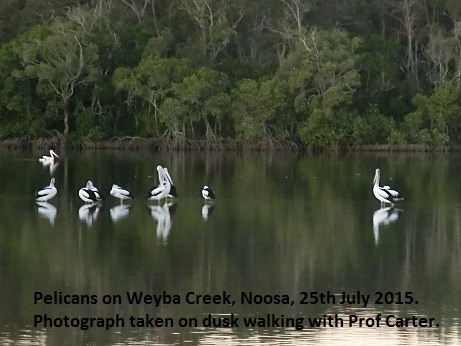OUTSPOKEN critic of catastrophic global warming theory, Bob Carter, died in Townsville on Tuesday.
Professor Carter did not like the term sceptic, he considered himself a rationalist, and popular usage of the term ‘climate change’ a tautology. As he wrote frequently: the geological record tells us that climate always changes. In Professor Carter’s passing we have lost a person who believed in value-free science.
When he was still directing the Marine Geophysical Laboratory at James Cook University, Professor Carter spent an evening with me at his home in Townsville poring over a single chart that was a proxy record of New Zealand’s climate over the last several thousand years. The time series data had been printed out on a long and continuous roll of paper: longer than the kitchen table so the end of the chart, that portion representing the present, was often dangling somewhere near the floor.
Professor Carter was always more interested in periods of dramatic climate change, particularly the Younger Dryas. The Younger Dryas occurred about 14,500 years ago, with an article in the Journal of Geophysical Research suggesting Greenland’s temperature rose 10° C (18° F) in a decade. Professor Carter was reluctant to endorse such a dramatic temperature increase, but always emphasized that relative to geological history, late 20th century rates of warming of less than 2° C per century, are not unusual.
Professor Carter was a real expert on climate change. He was director of the Australian Office of the Ocean Drilling Program which was an international cooperative effort to collect deep sea cores. From these cores past climates for specific regions have been reconstructed.
We both presented to the Coalition Environment Committee at Parliament House on 20th October last year. Professor Carter eloquently explained, with examples, how modern temperatures are not unusually warm; that current carbon dioxide levels are low relative to geological time; that as industrial emissions are added to the atmosphere, the less the “greenhouse” warming effect of each increment of carbon dioxide. Therefore, the professor concluded, “dangerous warming of this causation will not occur.”
Furthermore, Professor Carter added: the addition of 50 ppm of CO2 for 1981-2010 has fertilized an 11 percent increase in plant cover. Thus CO2 is both a strong environmental (greening the planet) and agrarian (crop yield increases) benefit.
In this presentation, the Professor also emphasized the importance of the scientific method. “To the extent that it is possible for any human endeavor to be so, science is value-free. Science is a way of attempting to understand the world in which live from a rational point of view, based on observation, experiment and tested theory. Irritatingly, especially for governments, science does not operate by consensus and it is often best progressed by mavericks. The alternative to a scientific approach is one based on superstition, phobia, religion or politics.” So, wrote Bob Carter in an article entitled ‘Science is not Consensus’, published by the Institute of Public Affairs in December 2003.
In the preface to his first book ‘Climate: The Counter Consensus’ Bob encouraged us to all to “trust authority less and our own brains more” as we assess the likely dangers of both known natural and hypothetical human-caused global climate change. Chapter 11 of this book outlined the real and present dangers posed by natural climate change. We are reminded of 1816, known as ‘the year without a summer’ for its intense cold associated with both the Dalton solar minimum and a super-eruption of the Indonesian volcano Tambora.
Professor Carter understood that such events were often associated with extreme hardship and famine, and that, to the extent possible, nations should use their resources to mitigate against such catastrophe. In particular, Professor Carter advocated what he referred to as Plan B: that future climate hazards, both natural and possibly human-caused, be assessed in terms of risk that vary in type and intensity from geographic place to place.
“Nobody,” the Professor would joke, “lives in a world climate”. Putting in place policies and plans to mitigate the dangers and vagaries of natural climate change must occur on a regional basis. Putting in place policies and plan to prepare for natural climate change, would, Professor Carter argued, make us ready for human-caused climate change, should it ever become manifest. Even with generous funding for the implementation of national hazard warning and disaster relief schemes, Bob concluded his book with comment that this would cost orders of magnitude less than those associated with the introduction of unnecessary and ineffectual emissions trading schemes.


 Jennifer Marohasy BSc PhD has worked in industry and government. She is currently researching a novel technique for long-range weather forecasting funded by the B. Macfie Family Foundation.
Jennifer Marohasy BSc PhD has worked in industry and government. She is currently researching a novel technique for long-range weather forecasting funded by the B. Macfie Family Foundation.